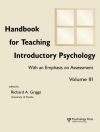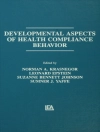‘This book is unique because of the focus on longitudinal studies and international perspectives . . . There is no other book like it . . . This book will be useful both as an advanced undergraduate or graduate course text and as a resource for scholars.’
– Rosemary Blieszner, Virginia Polytechnic Institute and State University
‘A very strong volume . . . [T]his book will clearly be a ′must-have′ for scholars interested in midlife.’
– Michael Marsiske, University of Florida
‘Midlife is no longer an ′uncharted territory′ in human development. A group of outstanding researchers from different countries focuses on this peak period in the life span . . . Various views, including historical, cultural, and socio-structural perspectives, are adopted . . . [C]omprehensive reviews of studies on almost all relevant domains of human development . . . are given and provide a colorful picture of what midlife in these days may be all about.’
– Sigrun-Heide Filipp, University of Trier, Germany
Middle adulthood is a critical period of the life course. How we develop in middle age–the central period of our lives–can influence how well we cope in our later years. Middle Adulthood: A Lifespan Perspective explores these issues by bringing together a distinguished group of international contributors associated with a range of prestigious longitudinal studies.
Key Features:
- Presents a much-needed longitudinal, lifespan perspective on middle age
- Provides a multicultural perspective to determine universal normative patterns of midlife development
- Addresses a broad scope of topics, including historical perspectives on the emergence of middle age as a normative developmental period in the life course, change and stability in personality, and cognitive development and decline
Middle Adulthood is designed for scholars, researchers, and practitioners in the field of adult development and aging. It is an excellent text for advanced undergraduate and graduate students studying midlife development in the departments of Developmental Psychology, Human Development and Family Studies, Gerontology, Family Diversity, and Health.
Mục lục
Preface
Part I: The Study of Middle Age: Historical and Demographic Perspectives
1. Historical Perspectives of Middle Age Within the Life Span – Hans-Werner Wahl & Andreas Kruse
2. The Midlife Generation in the Family: Patterns of Exchange and Support – Martin Kohli & Harald Kunemund
Part II: Early Life Influences on Middle Age
3. Genetic Influences on Midlife Functioning – Nancy L. Pedersen, Erica L. Spotts, & Kenji Kato
4. Personality in Young Adulthood & Functioning in Middle Age – Lea Pulkkinen, Taru Feldt, Katja Kokko
5. Impact of Past Transitions on Well-being in Middle Age – Pasqualina Perrig-Chiello, Sonja Perren
6. Cognitive Development in Midlife – Mike Martin & Daniel Zimprich
Part III: Impact of Middle Age on Functioning in Late Life
7. The Development of Physical and Mental Health from Late Midlife to Early Old Age – Dorly J. H. Deeg
8. Cognitive Trajectories in Midlife and Cognitive Functioning in Old Age – Sherry L. Willis & K. Warner Schaie
9. Self-Development at Midlife: Lifespan Perspectives on Adjustment and Growth – Jessica Dörner, Charlotte Mickler, & Ursula M. Staudinger
10. Middle Age and Identity in a Cultural and Lifespan Perspective – Freya Dittmann-Kohli
11. Metacognition in Midlife – Christopher Hertzog & Roger A. Dixon
Part IV: Summary and Future Directions
12. Midlife Development: Past, Present, and Future Directions – Mike Martin and Sherry L. Willis
Author Index
Subject Index
About the Editors
About the Contributors
Giới thiệu về tác giả
Mike Martin is Professor for Gerontopsychology and Director of the Center of Gerontology at The University of Zurich, Switzerland. He received a Master′s Degree at the University of Georgia, his Ph.D. in Developmental Psychology at The University of Mainz, Germany, and his habilitation at The German Center for Research on Ageing at The University of Heidelberg. His research focuses on longitudinal and experimental studies of cognitive and social development across the lifespan, including studies examining predictors of development in childhood, middle adulthood, old, and extreme old age. Recent publications include an encyclopedia of gerontology and a textbook on the psychological aspects of aging.












